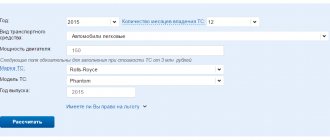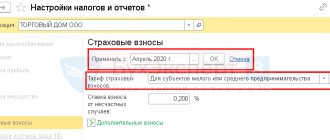According to the general provisions of Chapter 30 of the Tax Code of the Russian Federation, objects of taxation for Russian organizations are movable and immovable property recorded on the balance sheet as fixed assets in the manner established for accounting (clause 1 of Article 374 of the Tax Code of the Russian Federation). However, this chapter establishes some exceptions, in particular regarding movable property.
Let us consider the features of exemption from property tax for fixed assets that are movable property.
Tax benefit
Based on clauses
8 clause 4 art. 374 of the Tax Code of the Russian Federation as amended before January 1, 2015, was not subject to property tax on movable property registered on January 1, 2013 as fixed assets. Let us remind you that things that are not related to real estate are recognized as movable property. Registration of rights to movable things is not required, except for the cases specified in paragraph 2 of Art. 130 Civil Code of the Russian Federation. According to the provisions of the Federal Law of November 24, 2014 No. 366-FZ “On Amendments to Part Two of the Tax Code of the Russian Federation and Certain Legislative Acts of the Russian Federation,” clause 25 of Art. 381, which came into force on January 1, 2015. As follows from this norm, in relation to movable property registered as fixed assets on January 1, 2013, a benefit is provided in the form of exemption from property tax, with the exception of movable property registered as a result of the reorganization or liquidation of legal entities, as well as the transfer, including acquisition, of property between related parties.
In other words, movable property registered as fixed assets as a result of reorganization or liquidation, acquisition from related parties during 2013-2014, is recognized as subject to corporate property tax from January 1, 2015 (letter from the Ministry of Finance of Russia dated September 2 .15 No. 03-05-05-01/50440, dated 08/14/15 No. 03-05-05-01/47092, dated 08/5/15 No. 03-05-05-01/45142, dated 07/29/15 No. 03-05-05-01/43678).
Norm clause 25 art. 381 of the Tax Code of the Russian Federation can be applied by every Russian organization, and regardless of the fact, in particular, that a similar norm is absent in the Moscow Law of November 5, 2003 No. 64 “On the property tax of organizations” (letter from the Ministry of Finance of Russia dated January 23, 2015 No. 03-05-05-01/69731).
Who grants the right to property tax exemption?
Some categories of taxpayers are entitled to tax benefits.
This benefit allows you to pay only part of the tax or exempts you from it completely (Clause 1, Article 56 of the Tax Code of the Russian Federation). Legislatively, the rights to benefits and tax exemptions are enshrined in the Tax Code, and are also established by acts of the constituent entities of the Russian Federation (Article 56, Article 372 of the Tax Code of the Russian Federation).
Conventionally, property tax benefits can be divided into 2 groups:
- the benefits contained in the provisions of the Tax Code are valid in all constituent entities of the Russian Federation where property tax is established;
- benefits introduced by local authorities and valid only in the territory of the corresponding region (municipality).
The benefits established by the Tax Code are valid throughout Russia and do not require additional approval in the laws of the constituent entities of the Russian Federation (decision of the Supreme Court of the Russian Federation dated July 5, 2006 No. 74-G06-11).
Acquisition of movable property from a related party
We note that the possibility of applying the provisions of paragraph 25 of Art.
381 of the Tax Code of the Russian Federation does not depend on the procedure for maintaining accounting records of the transferred (acquired) object of movable property by the transferring (selling) organization and on the purposes of acquiring the property. For leasing
Consequently, regardless of the purpose for which the property was acquired, it is not exempt from property tax if it was acquired from a related party (letter of the Federal Tax Service of Russia dated May 29, 2015 No. BS-19-11/111).
In addition, the letter of the Ministry of Finance of Russia dated May 21, 2015 No. 03-05-05-01/29272 explained that based on the literal interpretation of the norm of clause 25 of Art. 381 of the Tax Code of the Russian Federation in relation to movable property that was received under a financial lease (leasing) agreement concluded between interdependent persons and which is recorded on the balance sheet of the lessor (or lessee) from January 1, 2013 as fixed assets, the specified tax benefit property of organizations does not apply. At the same time, the Russian Ministry of Finance noted that the issue raised in the appeal will be considered as part of the work carried out by the ministry to improve the legislation of the Russian Federation on taxes and fees.
If the lessor and the lessee are not recognized as interdependent persons, then movable property recorded on the lessee’s balance sheet from January 1, 2013 as part of fixed assets under one financial lease (leasing) agreement is not subject to taxation from January 1, 2015 (letter of the Ministry of Finance of Russia dated March 30 .15 No. 03-05-05-01/17326).
Purchasing property that requires installation
In accordance with paragraph 1 of Art. 375 of the Tax Code of the Russian Federation, the tax base for property tax is defined as the average annual value of property recognized as an object of taxation and accounted for at its residual value, which is formed in accordance with the established accounting procedure approved in the accounting policy of the organization.
The rules for the formation of information about the organization’s fixed assets in accounting are established in the Accounting Regulations “Accounting for Fixed Assets” (PBU 6/01), approved by Order of the Ministry of Finance of Russia dated March 30, 2001 No. 26n, according to which the unit of accounting for fixed assets is the inventory object (clause 6 of PBU 6/01).
According to the Chart of Accounts for accounting the financial and economic activities of organizations and the Instructions for its application, the organization’s expenses in objects that will subsequently be taken into account as fixed assets, including the cost of equipment transferred for installation and the costs of its installation, are taken into account in account 08 “ Investments in non-current assets." The initial cost of fixed assets, accepted for operation and registered in the prescribed manner, formed (taking into account the costs of acquisition, installation of equipment, etc.) is written off from account 08 to the debit of account 01 “Fixed Assets”.
The Ministry of Finance of Russia indicated (letters dated March 30, 2015 No. 03-05-05-01/17289, dated October 8, 2015 No. 03-05-05-01/5749) that the tax benefit provided for in paragraph 25 of Art. 381 of the Tax Code of the Russian Federation, does not apply to movable property accepted for accounting as part of fixed assets from January 1, 2013, requiring installation and acquired from an interdependent person, regardless of which person (interdependent or not) installed the equipment. In this case, installation costs may amount to the initial cost of a fixed asset (inventory item), the residual value of which is included in the average annual cost of tax-free property (letter of the Ministry of Finance of Russia dated February 25, 2015 No. 03-05-05-01/9217).
In a letter dated 03/05/15 No. 03-05-04-01/11797, the Ministry of Finance of Russia noted that movable property items made from materials that were purchased after January 1, 2013 from an interdependent person (not recognized as an interdependent person) as fixed assets, are not subject to taxation in accordance with paragraph 25 of Art. 381 Tax Code of the Russian Federation.
The question may be whether benefits can be applied to fixed assets that are restored using materials purchased from a related party for the purpose of their modernization and reconstruction. In paragraphs 14 and 27 PBU 6/01 stipulate that changes in the initial cost of fixed assets at which they are accepted for accounting are allowed in cases of completion, additional equipment, reconstruction, modernization, partial liquidation and revaluation of fixed assets. At the same time, the costs of modernization and reconstruction of an object after their completion increase its initial cost if, as a result of modernization and reconstruction, the initially adopted standard performance indicators (useful life, power, quality of use, etc.) of the fixed asset object are improved (increased).
If the property tax benefit for organizations was applied to fixed assets in accordance with clause 25 of Art. 381 of the Tax Code of the Russian Federation, then the specified benefit for objects that have been restored using materials purchased from an interdependent party for their modernization and reconstruction should be preserved (letter of the Ministry of Finance of Russia dated March 5, 2015 No. 03-05-04-01/11797).
Purchase of property under a commission agreement
According to the Plan, to summarize information on the availability and movement of goods accepted for commission in accordance with the agreement, an off-balance sheet account 004 “Goods accepted for commission” is provided.
Therefore, goods received on commission are not reflected on the commission agent’s balance sheet, but are taken into account by him on the balance sheet as goods accepted on commission. However, this property is not the property of the commission agent.
Taking into account the above, the Ministry of Finance of Russia, in letter dated April 27, 2015 No. 03-05-05-01/24266, concluded that in relation to movable property registered as fixed assets from January 1, 2013 under a commission agreement concluded with an interdependent person - a commission agent, the customer has the right to apply a benefit in accordance with clause 25 of Art. 381 Tax Code of the Russian Federation. In this case, the condition for its application is the fact that the third party (supplier) is not interdependent in relation to the commission agent and (or) the principal (customer). A similar position was stated in the letter of the Ministry of Finance of Russia dated March 30, 2015 No. 03-05-05-01/17304.
What categories of individuals do not pay property tax?
Since 2015, Chapter 32 of the Tax Code has come into force, according to which property tax for individuals is generally calculated based on cadastral value.
Tax payers are owners of residential real estate, garages, parking spaces, etc.
Find out how personal property tax is calculated here .
According to Art. 407 of the Tax Code of the Russian Federation the following categories of individuals are not payers of property tax:
- Heroes of the USSR and the Russian Federation;
- participants in the Great Patriotic War and other military operations;
- disabled people of groups I or II, as well as disabled people since childhood;
- military personnel;
- family members of military personnel in the event of loss of a breadwinner;
- pensioners;
- persons exposed to radiation as a result of nuclear tests at the Semipalatinsk test site, the disaster at the Chernobyl nuclear power plant, as well as at the Mayak production association, etc.
Also exempt from paying tax are owners of outbuildings located within the boundaries of dacha farms, gardening, individual housing construction, the area of which does not exceed 50 square meters.
Individuals entitled to tax benefits should submit a corresponding application and documents confirming their right to the benefit to the Federal Tax Service at their place of residence.
A tax benefit is provided to an individual in relation to 1 property. The taxpayer should be notified of his decision to select a preferential asset no later than November 1 of the year that is the tax period. If notification of the selected property is not provided, the benefit is provided in relation to the asset with the maximum amount of calculated tax.
Reorganization of organizations
In a number of letters (dated 08/14/15 No. 03-05-05-01/47079, dated 06/1/15 No. 03-05-05-01/31575, dated 06/1/15 No. 03-05-05 -01/31574, dated May 13, 2015, No. 03-05-05-01/27322) The Ministry of Finance of Russia clarified the procedure for applying corporate property tax on movable property registered as fixed assets by legal entities in which reorganization was carried out, as well as the question of whether bringing the constituent documents into compliance with the norms of the Civil Code of the Russian Federation should be considered a reorganization (liquidation) of legal entities.
According to the amendments made to the Civil Code of the Russian Federation, Russian legal entities are obliged, after September 1, 2014, to bring their constituent documents and names into compliance with the norms of Chapter 4 of the Civil Code of the Russian Federation. This obligation arises when the constituent documents are amended for the first time.
This requirement is associated with the introduction into Chapter 4 of the Civil Code of the Russian Federation of provisions on new organizational and legal forms of legal entities, for example, instead of an open joint-stock company, a new organizational and legal form of “public joint-stock company” is provided (Article 66.3 of the Civil Code of the Russian Federation)
In accordance with the Civil Code of the Russian Federation, the name of a legal entity must contain an indication of its organizational and legal form. In this case, a change in name does not entail changes to the title and other documents containing the previous name of the legal entity. The constituent documents of such legal entities, until they are brought into compliance with the norms of Chapter 4 of the Civil Code of the Russian Federation, are valid to the extent that they do not contradict these norms.
Part 10 of Art. 3 of the Federal Law of May 5, 2014 No. 99-FZ “On amendments to Chapter 4 of Part 1 of the Civil Code of the Russian Federation and on the recognition as invalid of certain provisions of legislative acts of the Russian Federation” (hereinafter referred to as Law No. 99-FZ) also established that that there is no need to re-register previously created legal entities (including joint stock companies) in connection with the entry into force of this law.
The procedure for reorganizing legal entities is defined in Art. 57 of the Civil Code of the Russian Federation and includes such forms of reorganization as merger, accession, division, separation and transformation. On this basis, the Russian Ministry of Finance believes that bringing the constituent documents, as well as the names of legal entities created before the entry into force of Law No. 99-FZ, in accordance with the norms of Chapter 4 of the Civil Code of the Russian Federation does not constitute a reorganization (liquidation) of legal entities.
Thus, if a legal entity brings its name into compliance with the requirements of Law No. 99-FZ, then its movable property, recorded as fixed assets, is not subject to corporate property tax, if it was not previously subject to this tax.
Results
Benefits for corporate property tax are established by the Tax Code and can also be introduced at the regional level.
The right to a benefit must be documented. Persons exempt from property tax include special regime residents, for whom, since 2015, the obligation to pay this tax on real estate for a certain purpose has been introduced with a tax base in the form of cadastral value. There are also benefits for property taxes paid by individuals. You can find more complete information on the topic in ConsultantPlus. Free trial access to the system for 2 days.
Movable property included in depreciation group I or II
From January 1, 2015, in relation to fixed assets included in the first or second depreciation group in accordance with the Classification of fixed assets approved by the Government of the Russian Federation, paragraphs should be followed.
8 clause 4 art. 374 of the Tax Code of the Russian Federation, according to which such fixed assets are not recognized as subject to property tax, regardless of the date of their registration as fixed assets and transfer (including acquisition) between persons recognized (not recognized) as interdependent (letters from the Ministry of Finance of Russia from 2.09.15 No. 03-05-05-01/50440, dated 14.08.15 No. 03-05-05-01/47092, dated 5.08.15 No. 03-05-05-01/45142, dated July 29, 2015 No. 03-05-05-01/43678). As for the taxation of movable property included in other depreciation groups and registered from January 1, 2013 as fixed assets (including in 2013 and 2014), a tax benefit is applied to them in accordance with clause 25 of Art. . 381 Tax Code of the Russian Federation.
Is there an exemption from property tax for individual entrepreneurs and LLCs under special regimes?
Yes, it exists. Among those who are exempt from property tax are organizations and individual entrepreneurs with special regimes. In this case, the following conditions must be met:
| No. | Condition | IP | Organization |
| 1 | The tax regime chosen is | STS, UST, UTII or patent (only for individual entrepreneurs) | |
| 2 | Property in use | As part of business activities | Ownership of the company |
| 3 | Special conditions | There are available documents confirming the use of property in work (lease agreement, agreement with suppliers, payment documents, etc.) | It is on the balance sheet of the enterprise |
However, we note that starting from 01/01/2015, individual entrepreneurs and companies in special regimes must pay tax on the real estate they own for a specific purpose based on its cadastral value (Article 378.2 of the Tax Code of the Russian Federation).
Change in legislation
It should be noted that bill No. 912150–6 is currently under consideration in the State Duma, according to which it is planned to make some positive changes for taxpayers to the norm of paragraph 25 of Art.
381 Tax Code of the Russian Federation. This bill proposes to clarify the wording of this paragraph of the Tax Code of the Russian Federation, supplementing it with conditions in accordance with which movable property registered as fixed assets from January 1, 2013 will be subject to taxation:
if, during the reorganization or liquidation of legal entities, such property of the transferring party was registered as a fixed asset before January 1, 2013; in case of transfer, including acquisition, of property between related parties, if such property was registered with the transferring party as a fixed asset before January 1, 2013.
Innovations for 2021
Another group of innovations will be introduced for taxpayers starting in 2021:
— the obligation to submit transport and land tax returns to the tax authorities for 2021 and subsequent tax periods will be cancelled;
— tax authorities will begin sending organizations (their separate divisions) messages about the calculated amount of transport and land taxes;
- the deadlines for payment of transport and land taxes for organizations will become uniform - no later than March 1 of the year following the expired tax period.
Let's take a closer look at each innovation.





